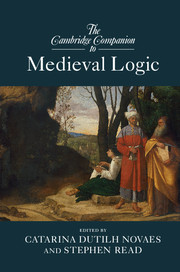Book contents
- Frontmatter
- Contents
- List of Contributors
- Introduction
- PART I PERIODS AND TRADITIONS
- PART II THEMES
- 8 Logica Vetus
- 9 Supposition and Properties of Terms
- 10 Propositions: Their Meaning and Truth
- 11 Sophisms and Insolubles
- 12 The Syllogism and Its Transformations
- 13 Consequence
- 14 The Logic of Modality
- 15 Obligationes
- Bibliography
- Index
11 - Sophisms and Insolubles
from PART II - THEMES
Published online by Cambridge University Press: 05 September 2016
- Frontmatter
- Contents
- List of Contributors
- Introduction
- PART I PERIODS AND TRADITIONS
- PART II THEMES
- 8 Logica Vetus
- 9 Supposition and Properties of Terms
- 10 Propositions: Their Meaning and Truth
- 11 Sophisms and Insolubles
- 12 The Syllogism and Its Transformations
- 13 Consequence
- 14 The Logic of Modality
- 15 Obligationes
- Bibliography
- Index
Summary
Just prior to the spread of universities across Europe in the fourteenth century, a systematic method for training the minds of young future leaders to think rationally began to crystallize through the practice of logical disputations. The oldest centres of logic in Europe were Oxford and Paris, both originating in the eleventh century, and rich traditions were built up there over the subsequent years. In fourteenth-century Oxford, before earning a Bachelor of Arts, a student was required to earn the title of sophista generalis (Leader 1989, 96). As such, he was allowed to participate in structured disputations involving a respondent and an opponent, and would have learned the art of considering a sentence called a sophism (Latin sophisma) against a hypothetical scenario or given set of assumptions, called a casus in Latin. Typically, it was not trivial to decide whether the sentence was true or false, and arguments could be made on both sides. Sophisms thus presented a puzzle to be solved. In medieval texts, the discussion of a sophism follows a more or less strict outline that includes arguments both for and against the truth of the sentence under the assumption that the casus is true, and a resolution of the puzzle.
The etymologically related word sophistry has a connotation of gratuitous obfuscation not shared by sophism. The arguments for and against the same sentence reflect puzzlement, but the aim was not to invite trickery. Rather, skills achieved lay in the disambiguation of Latin expressions, in the exact formulations of their truth conditions, and in the recognition of inferential connections between them. In short, rather than sophistry, sophisms led to the treatment of Latin as a precise, logical language. This programme bears some similarity to that of Richard Montague, the founder of modern formal semantics, who wrote, “I reject the contention that an important theoretical difference exists between formal and natural languages” (Montague 1974).
Examples of sophisms, with accompanying discussion, can be found both in independent collections of sophisms and within treatises on logical topics, regarding such quantificational words as ‘every’ or exclusives like ‘only’. One much-discussed thirteenth-century sophism is ‘Every phoenix exists’ (Tabarroni 1993), which occurs in many different sources, including Walter Burley's Questions on Aristotle's ‘On Interpretation’ (Brown 1974, 260–262).
- Type
- Chapter
- Information
- The Cambridge Companion to Medieval Logic , pp. 265 - 289Publisher: Cambridge University PressPrint publication year: 2016
- 2
- Cited by



